University of Oxford’s largest ever building project is a ‘palace to the humanities’
In a bid to save the study of the humanities, The University of Oxford has declared the Stephen A. Schwarzman Centre to be officially opened to the academic community on October 13 2025.
The site chosen for the building was one of the last empty slots in the old Radcliffe Infirmary, placed between the 18th century Radcliffe Observatory and the more modern Blavatnik School of Government, both of which share the same philanthropic origins.
The former is a meteorological site, now used as a medical research facility, and the latter is focused on teaching government and public policy reform.
The need for building has only been exacerbated by the crisis the humanities sector has been facing
The Schwarzman building has been a project six years in the making, with a donation of £185 million from philanthropist and businessman Stephan A. Schwarzman, Blackstone CEO, which makes it the largest donation since the Renaissance.
Oxford remains at the top of philanthropic donations. Data from the higher Education Statistics Agency (HESA) shows that UK providers recorded a £2.2 billion in donations and endowments for 2022-23.
Bringing seven humanities faculties and research institutes together, the centre hosts a 500-seat concert hall, 250-seat theatre black-box performance lab, white-box exhibition space, and recital hall which is keen to host a cultural programme across music, theatre, dance, and art for the wider public of Oxford.
‘The new Schwarzman Centre […] enables us to come together in a new dialogue in one extraordinary building’
Prof. Irene Tracey, Oxford University Vice-Chancellor
With a key design principle being sustainable development, the building is on track to achieve a Passivhaus certification, making it the largest Passivhaus scheme in England.
The need for building has only been exacerbated by the crisis the humanities sector has been facing in recent years.
Social science, arts, and humanities programmes are being cut throughout the UK, with students from disadvantaged or rural backgrounds being most likely to miss out on studying these disciplines.
‘The pace of change…has only…reinforced the importance of Oxford’s global leadership in navigating today’s dynamic world’
Stephen A. Schwarzman, Blackstone CEO
Professor Irene Tracey, Vice-Chancellor of the University of Oxford says: “the new Schwarzman Centre, with its state-of-the-art facilities, reaching out deep into the international cultural community, enables us to come together in a new dialogue in one extraordinary building”.
With the building boasting to be a centre for both knowledge and culture, Blackstone CEO Stephen A. Schwarzman himself expressed that the study of the humanities and ethics were critical to addressing the fundamental questions society faced.
He said: “The pace of change…has only…reinforced the importance of Oxford’s global leadership in navigating today’s dynamic world”.

Comments (1)
The world needs science & it’s progress.
Humanities serve little purpose save provide people with no ability in science a salary.
The humanities could not cope at Bletchley.
They thought mathematicians were an odd breed. AND who solved the coding needs?
NOT the humanities.
Yes the sciences provided the UK with its rescue in its hours of greatest need.